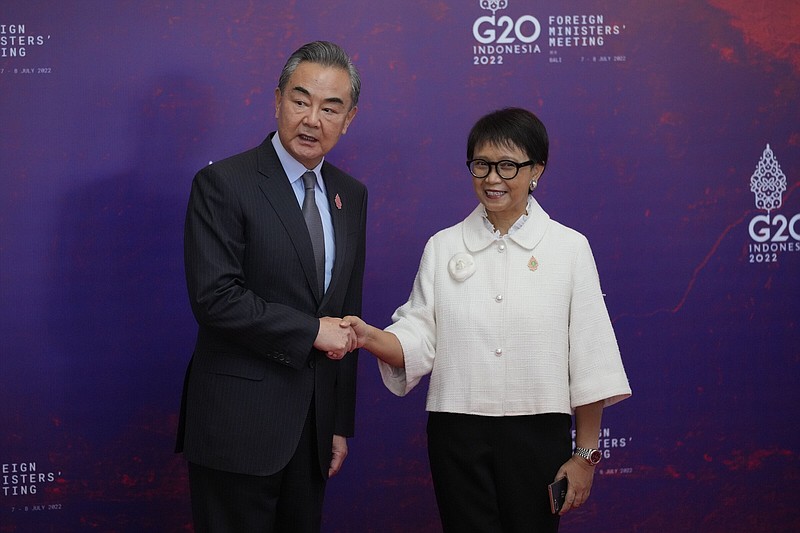NUSA DUA, Indonesia -- Deeply divided top diplomats from the world's richest and largest developing nations failed to find common ground Friday over Russia's war in Ukraine and how to deal with its global impacts, leaving prospects for future cooperation in the forum uncertain.
At talks that were were knocked off balance by two unrelated and unexpected political developments, including the shocking assassination of a former Japanese prime minister, far from the Indonesian resort of Bali where they were meeting. The group of 20 foreign ministers heard an emotional plea for unity and an end to the war from their Indonesian host.
Yet, consensus remained elusive amid deepening East-West splits driven by China and Russia on one side and the United States and Europe on the other. There was no group photo taken nor a final statement issued as has been done in previous years, and acrimony appeared pervasive, especially between Russia and Western participants.
Although they were present in the same room at the same time for the first time since the Ukraine war began, U.S. Secretary of State Antony Blinken and Russian Foreign Minister Sergey Lavrov pointedly ignored each other.
Lavrov walked out of the proceedings at least twice: once when his German counterpart Annalena Baerbock spoke at the opening session and again just before Ukrainian Foreign Minister Dmytro Kuleba was to speak by video at the second session, according to a Western diplomat present.
One goal of Friday's meeting was to lay the groundwork for the summit Indonesia will host in November.
Indonesian Foreign Minister Retno Marsudi had urged the group -- which included Lavrov, Chinese Foreign Minister Wang Yi, Blinken and several European counterparts -- to overcome mistrust for the sake of a planet confronting multiple challenges from the coronavirus to climate change as well as Ukraine.
"The world has yet to recover from the pandemic but we are already confronted with another crisis: the war in Ukraine," Marsudi said. "The ripple effects are being felt globally on food, on energy and physical space."
She noted that poor and developing countries now face the brunt of fuel and grain shortages resulting from the war in Ukraine and said the G-20 has a responsibility to step up and deal with the matter to ensure the rules-based global order remains relevant.
The Ukraine war has shaken that order, she said.
"Honestly, we cannot deny that it has become more difficult for the world to sit together," Marsudi said. "The world is watching us, so we cannot fail."
She said the Ukraine war was discussed at almost all bilateral meetings during the one-day gathering.
But after the meeting was over, Marsudi could not point to any agreements reached by all participants, although she said there had been broad concern about food and energy disruptions caused by the war in Ukraine. She added that only "some countries expressed condemnation of the act of invasion."
"You know, it was not us who abandoned all contacts," Lavrov told reporters after the first session. "It was the United States. ... If they don't want to talk, it's their choice."
Shortly thereafter, Blinken took direct aim at the Russian delegation, accusing Moscow of blocking millions of tons of grain in Ukrainian ports and causing food insecurity in large parts of the world, according to a Western diplomat present.
Lavrov was not there for Blinken's comments and his stand-in began Russia's intervention by telling the group she did not have prepared remarks, according to the diplomat, who spoke on condition of anonymity to describe the closed-door meeting.
U.S. officials said they were determined not to allow distractions to divert attention from the disruption to world food and energy supplies caused by Russia's war in Ukraine, blaming Moscow for it, and marshalling a response to halt shortages that are already wreaking havoc in Africa, Asia and elsewhere.
The competition for support among the sides has been fierce. Wang and Lavrov each stopped in various Asian capitals on their way to Bali, drumming up support for various Chinese and Russian positions and fortifying their ties among non-allied nations.
Blinken, the French, Germans and Brits, meanwhile, all arrived in Bali from two Western-oriented and organized gatherings in Europe last week: the G-7 and NATO summits at which there was little sign of rancor or debate and unity on Ukraine was assured.
